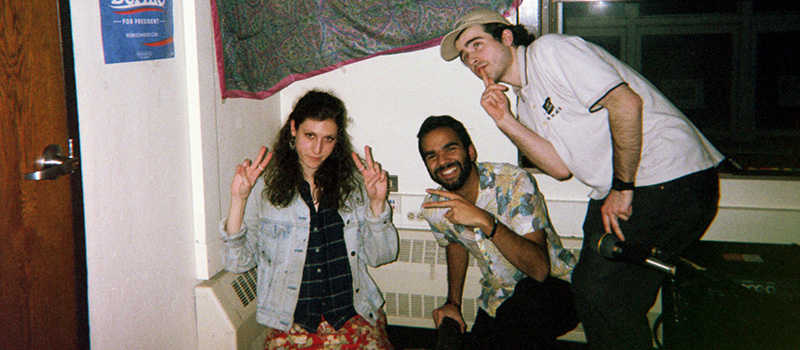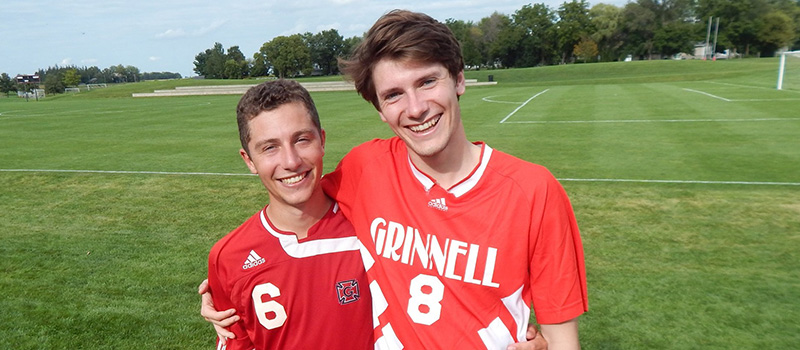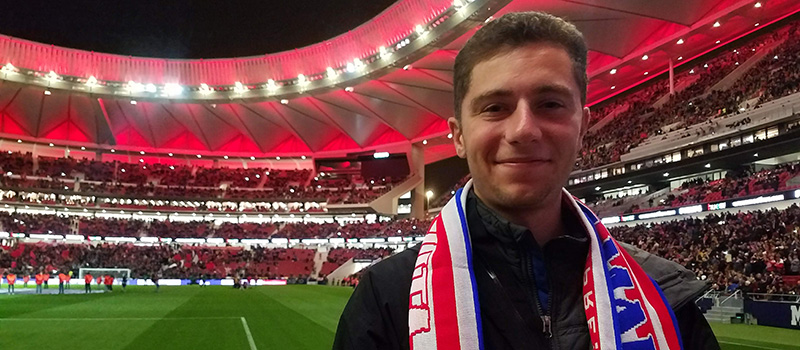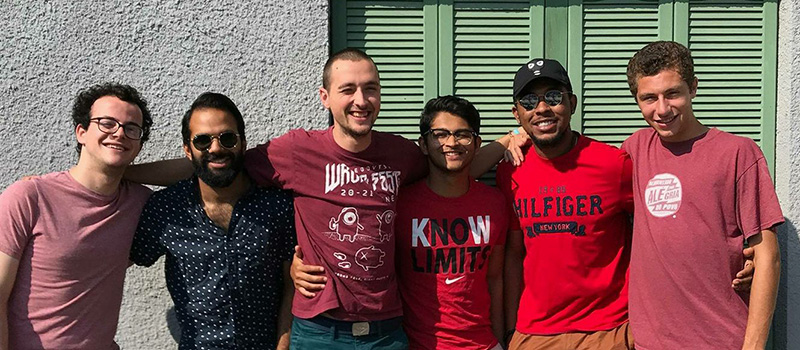Tracking COVID and the art of navigating constant uncertainty
August 30, 2024 — Artis Curiskis ’18 spent much of 2018 and 2019 traveling the world as a Thomas J. Watson Fellow. Like many of us, he spent 2020 closer to home. His work from home would eventually translate into an acclaimed investigative reporting podcast and a Peabody Award nomination.
Curiskis’ first forays into audio production didn’t begin in a recording studio; they began in his dorm room on Read First during his second year at Grinnell College. One day, his friend Ronan Brooks ’18 and roommate Erhaan Ahmad ’18 were jamming in their room, and inspiration struck.
“What if we brought everyone here and threw a concert in our dorm room?” he says. The first “Tiny Dorm Concert” as they came to known featured Ella Williams ’18 (known musically as Squirrel Flower). “The idea behind Tiny Dorm Concerts was that student bands could always have a place to play and get live recordings of their performances,” he says, “I suddenly found myself figuring out where the XLR cord went and making sure the levels were correct.”
 Ella Williams ’18, left, Erhaan Ahmad ’18, and Ronan Brooks ’18 gathered for a Tiny Dorm Concert at Read Hall.
Ella Williams ’18, left, Erhaan Ahmad ’18, and Ronan Brooks ’18 gathered for a Tiny Dorm Concert at Read Hall.
They continued to run Tiny Dorm Concerts six to eight times a semester in every corner of campus throughout the rest of their time at Grinnell.
When Curiskis wasn’t studying or moving dorm furniture before a show, he played soccer for Grinnell and served as men’s team captain his fourth year. Curiskis has played soccer throughout his life, in no small part due to a string of inspiring coaches from youth soccer all the way to Pioneers Coach Brian Jaworski.
“I came to appreciate and love how Coach Jaworski approached each day with a sense of intensity and pride,” Curiskis says. “He has an ability to fully throw himself into the game, but once the game’s over, it’s over.”
Jaworski’s mindset, along with encouragement from his friend Sophiyaa Nayar ’17 and Ann Landstrom, assistant dean and director of global fellowships & awards, were front of mind as Curiskis refined a Watson application and itinerary. His Global Soccer Diplomacy fellowship explored his evolving relationship with the game and geopolitics. Throughout his travels, Curiskis conducted video and audio interviews with people he met.
“Throughout my Watson year, I saw how soccer was used to bring people together and generate a shared identity, especially one that’s not recognized in the nation or within global politics,” he says. “When you start generating a cohesive identity of community then there’s more opportunity to rise, create protests, and identify a desired change. Soccer can be a fun, escapist game, but it’s not always that. It’s a space that is constantly shaping and impacting politics.”
 Artis Curiskis ’18, left, and Antonio DiMarco ’18 pose for a photo after the 2019 soccer alumni game.
Artis Curiskis ’18, left, and Antonio DiMarco ’18 pose for a photo after the 2019 soccer alumni game.
After circling the globe, he returned home and began trying to make sense of post-graduate life and his year abroad. He coached a women’s varsity high school soccer team and applied for journalism opportunities. In early March 2020, Curiskis toured Minnesota Public Radio with Sasha Aslanian ’90, who now works for ABC News. After the tour, Aslanian invited Curiskis to an online forum where radio and storytelling opportunities were posted. Just a few weeks later, Curiskis saw a post seeking volunteers for the newly formed Covid Tracking Project. “My immediate reaction was ‘sign me up,’” he says.
The COVID Tracking Project was a “volunteer-run emergency data organization” of The Atlantic, Curiskis says, which became the “de facto source” for COVID-19 information in the U.S. “The CDC wasn’t releasing data, so we had to do it,” he says, “no one knew how to navigate the pandemic.”
Curiskis first worked on the outreach and reporting team. At the time, COVID data wasn’t reliably available on state health department websites, so Curiskis would watch gubernatorial press conferences, as many as four at a time, to monitor them for announcements including deaths, case numbers, and test results.
Curiskis’ supervisor was Kara Oehler, an acclaimed audio journalist, and Oehler eventually promoted him. Together, they co-led the outreach and reporting group and accumulated more volunteer responsibilities. “We ended up taking on larger parts of the project including alerting state health departments to data discrepancies,” he says.
 Curiskis is pictured at The Cívitas Metropolitano in Spain, the home of Atlético de Madrid, during his His Global Soccer Diplomacy Watson Fellowship.
Curiskis is pictured at The Cívitas Metropolitano in Spain, the home of Atlético de Madrid, during his His Global Soccer Diplomacy Watson Fellowship.
They also created a Long-Term Care Covid Tracker, a substantial dataset comprised of all the long-term care facilities that were subject to both state and federal reporting regulations. While long-term care facility residents comprise less than 1% of the U.S. population, Curiskis says, residents of these facilities accounted for nearly 40% of U.S. COVID deaths in the first years of the pandemic.
Curiskis and Oehler bonded over their shared interest in audio documentaries and began to consider a broader, investigative series beyond the scope of the COVID Tracking Project, which was geared specifically to just reporting the data. “We had learned so much that should be publicized about the CDC, how these data systems work, and how the U.S. is particularly unprepared for pandemics,” Curiskis says.
A few months after the Tracking Project wound down in 2021, Curiskis and Oehler decided to move forward with an investigative podcast. The series would grapple with the fundamental questions of how the Center for Disease Control and Prevention so thoroughly botched and enabled the unchecked spread of the coronavirus in the U.S. Oehler and Curiskis “reported, produced, and managed nearly every square inch of” what became the Peabody Award-nominated COVID Tracking Project Podcast, Curiskis says.
The three-episode series, consisting of hundreds of interviews, was first published by Reveal, part of the Center for Investigative Reporting, in April 2023. The series is being re-released this month along with a new bonus episode.
 During his student days, Curiskis, right is pictured with his High Street friends: Jonah Zimmermann ’18, left, Erhaan Ahmad ’18, Aleksandar Hrusanov ’18, Ayon Dey ’18, and Sydney Quartey ’18.
During his student days, Curiskis, right is pictured with his High Street friends: Jonah Zimmermann ’18, left, Erhaan Ahmad ’18, Aleksandar Hrusanov ’18, Ayon Dey ’18, and Sydney Quartey ’18.
Now based in New York City, Curiskis is a Ben Bagdikian Fellow at Mother Jones. He also works with Climate Desk, a group of media outlets that collaborate to strengthen their collective climate coverage. He’s produced two recent pieces for so far, one on Congresswoman Ilhan Omar’s re-election campaign and another on a seven-year effort by Mother Jones and Reveal to obtain a single statistic about former police weapons at recovered crime scenes, through Freedom of Information Act requests and litigation.
“Deep down I’m a documentarian,” he says, one with a desire to produce impactful reporting “that uncovers injustice and inequities” while “telling a person’s story in a holistic way.” A story that creates change “is the end all be all for me,” he says. Given the state of journalism, the knack for “navigating constant uncertainty” he’s developed thanks to his Watson year, COVID investigations, and yes, even producing dorm room concerts, will continue to pay dividends.
“I started off by throwing myself into some projects I believed in,” he says. “Sometimes I feel like I’m stumbling through the darkness, but you have to hope that it will work out.”
— by Joe Engleman ’14